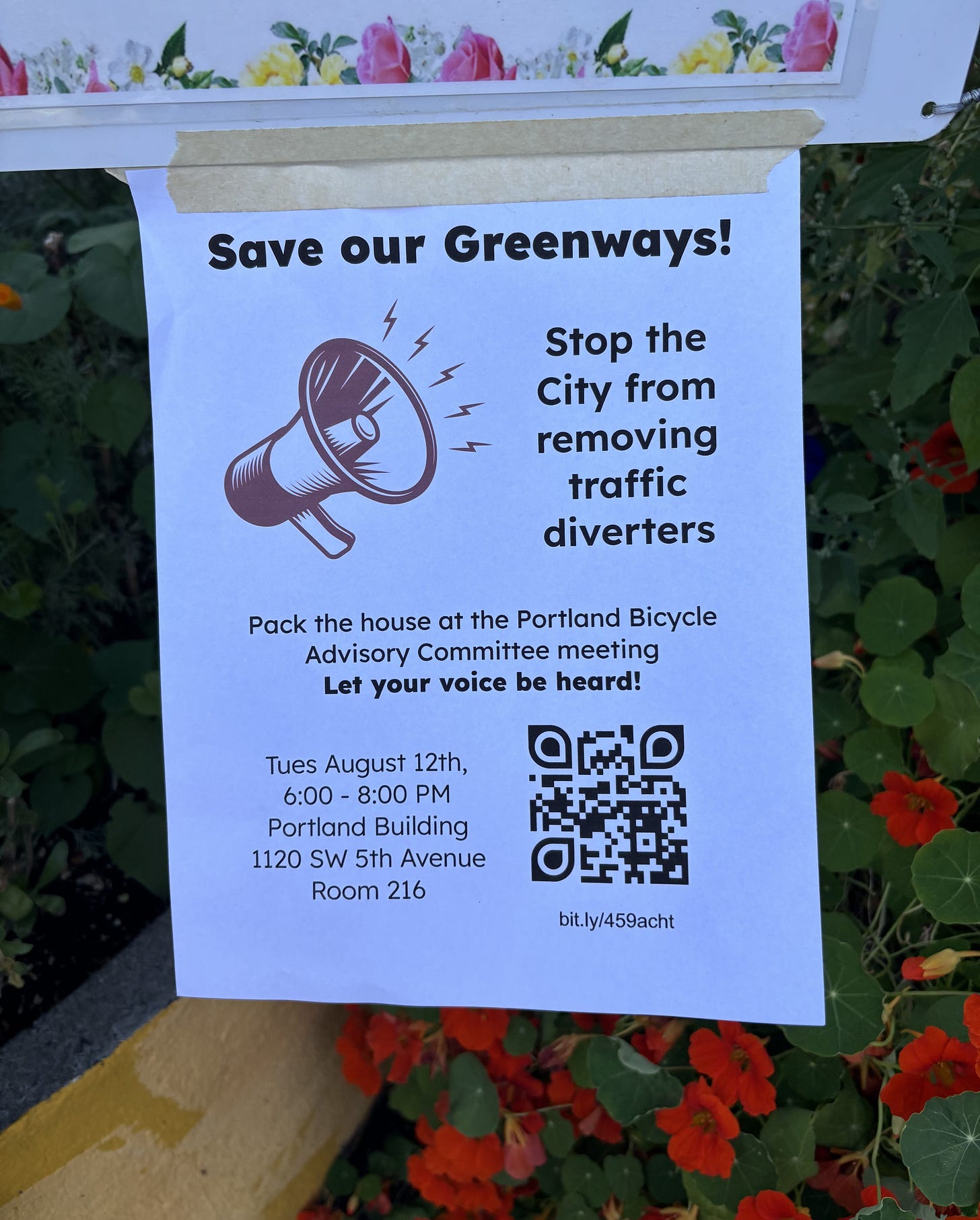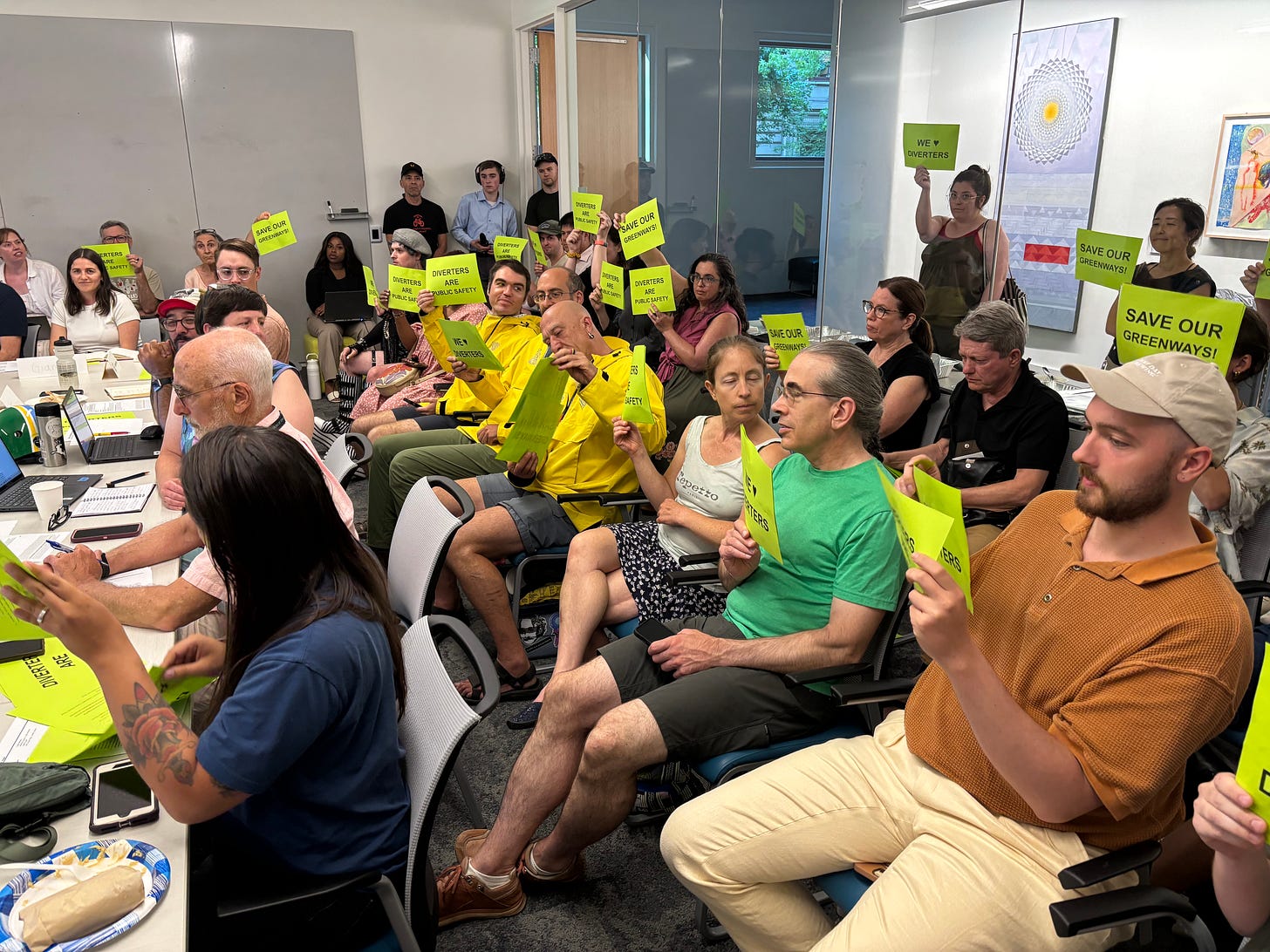Diverter defenders win Round 1
Debate will continue over extent of City Council powers
For weeks, the traffic diverter at Northwest 20th and Everett streets has been the most talked about traffic control device in the city. Bicycle activists have come to the defense of concrete planters that keep them safe by preventing northbound drivers from crossing Everett, and city leaders on up to the mayor have taken their side.
Television crews covered a notable protest last week, and BikePortland became the go-to source concerning who wanted the diverters removed, for what reason and against what precedent. Finally, plans to remove this diverter and another set of diverters on Northwest Johnson Street under Interstate 405 were “paused” by Mayor Keith Wilson an hour before a charged-up crowd of 50 or more at the Portland Bicycle Advisory Committee geared up to push against any public official taking the other side.
The mayor overruled the City Administrator Michael Jordan’s position the day after its issuance. It was a clear victory for the bike lobby, but what does the affair say about the health of city government in its first months under a new charter?
Cycling activists, and the three City Council members in attendance, said it was a victory for transparency, citizen participation and data-driven policy. They had a point.
The removal plan was hatched by Anne Hill, director of Portland Environmental Management Office, a nuisance abatement program operating out of the mayor’s office. PEMO cuts through bureaucracy and time-consuming processes. Its meetings aren’t announced and minutes are not taken. Hill cited increased crime in the vicinity and the difficulty of Portland Police Bureau to patrol the area between Stadium Fred Meyer and Couch Park, but her evidence was thin, as BAC members emphasized.
The attendance of the City Council members at a citizen advisory committee may be unprecedented, and they were not there to merely listen. They cited city code to declare that the council, and not the mayor or city administrator, is in charge of transportation policy, and they intend to act accordingly.
City Councilor Mitch Green took the foiling of diverter removals as evidence that Portland’s new charter is working, allowing citizens and their representatives to expose and block actions taken in secret. City Councilor Sameer Kanal, who co-chairs the council’s public safety committee, which might have been expected to know that the Portland Police Bureau sought the removals, said even he didn’t know about such plans until reading it on BikePortland Aug. 1.
A case against democracy and transparency can be made on the grounds of division of powers. The administrative branch should have the authority to carry out democratically established policies and not be bound by public participation processes at each step. The City Council adopts legislation and sets budgets, while the mayor and city administrator enact programs to carry out this mandate.
Will Aitchison, a Northwest resident with lengthy experience dealing with local governance, says Portland’s charter was created to respect such boundaries.
“The whole idea about charter reform … was that the council was to concern itself with broad policy issues, not the minutia of running a day-to-day government,” Aitchison wrote in a private email.
By meddling in issues such as the diverters or overruling Portland Children’s levy grants, the council is getting out of its lane, he suggested.
“What about tackling some of the many overarching policy issues we’re facing? We’ve seen no coherent plan from the council … on things like homelessness, addiction, the need for more public safety, infrastructure, budgeting maintenance as a component of new projects, the voice of neighborhoods and so many more issues.”
The Northwest Portland diverter gambit may have failed, but the separation of powers debate in City Hall, and on the streets, may only grow.





The similarities between this case and the far more damaging plan to open a large overnight shelter in NW could not be more glaring. In both, the City has apparently pushed ahead without transparent process, data-driven justification, or meaningful community engagement. The only difference is that here, the project was swiftly paused once District 4 representatives stepped in—while hundreds of residents/business owners have shown up, written, testified, and pleaded for the city to reconsider the ill-advised shelter plan, only to be ignored. Why is this much smaller matter granted immediate attention and support from District 4 reps while large and costly homeless policy decisions that impact thousands are not getting the same level of consideration? Do we need to prove we ride bicycles or check some other political box to be taken seriously?
A “victory for transparency, citizen participation, and data driven policy”… are these things supported by our city government in larger policies that impact livability and safety or just specific traffic diverters?
The city charter is "working" just as Julia Meier and her acolytes on the charter commission designed it--a city run by and for loudmouthed, organized, and dare we say fanatical "minorities." It was sold as a sop to BIPOCs, but in reality put the socialist cult in the driver's seat...all "elected" with just 25-percent of a computer-controlled vote. This ain't gonna change, and people can write all the memos they want--the coup worked.